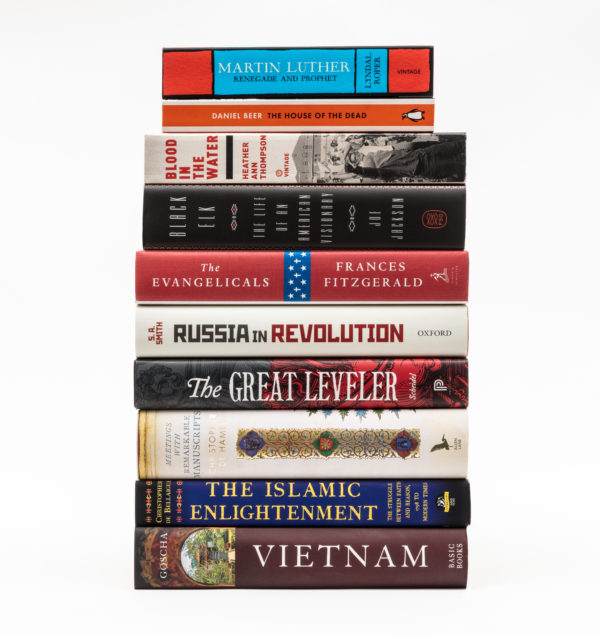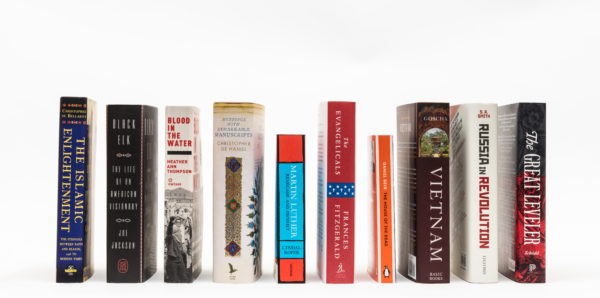September 26th 2017 in News
US$75,000 Cundill History Prize reveals longlist that stretches the globe
The Cundill History Prize has revealed a longlist that ranges from Vietnam to the Islamic world and from Russia to North America to be in contention for the international prize that rewards the best history writing in English.
US$75,000 are given to the winner, making the prize the richest non-fiction prize for a single work in English. The two runners up each receive a Recognition of Excellence Award worth US$10,000.
The eminent jury of five, under the chair of Margaret MacMillan, has chosen ten historians from five countries to be in the running for the prize in its 10th anniversary year.
Margaret MacMillan said: “Our longlist reflects the exciting and varied state of history today. The books on it cover subjects from Vietnam to Native American history and range in time from prehistory to the present. Their outstanding men and women authors come from around the world. It certainly wasn’t easy for our jury to whittle down over 300 entries into 10 but I am happy that we have come up with such a strong and interesting selection.”

- Black Elk by Joe Jackson
- Blood in the Water: The Attica Prison Uprising of 1971 and its Legacy by Heather Thompson
- Martin Luther by Lyndal Roper
- Meetings with Remarkable Manuscripts by Christopher de Hamel
- The Evangelicals: The Struggle to Shape America by Frances FitzGerald
- The House of the Dead: Siberian Exile Under the Tsar by Daniel Beer
- The Islamic Enlightenment: The Struggle Between Faith and Reason, 1798 to Modern Times by Christopher de Bellaigue
- Vietnam: A New History by Christopher Goscha
- Russia in Revolution: An Empire in crisis, 1890 to 1928 by Stephen Smith
- The Great Leveler: Violence and the History of Inequality from the Stone Age to the Twenty-First Century by Walter Schneidel
Margaret MacMillan is joined by the British-American historian and author Amanda Foreman, the award-winning Oxford Professor Roy Foster, the decorated Canadian journalist and author Jeffrey Simpson, and the Oxford Professor of Modern China Rana Mitter to judge the prize.
Rana Mitter said: “As a historian of China I’m particularly delighted at how wide the geographical range of these books are. All are outstanding in quality. I note in terms of range that we have a long study of Vietnam, a major country in Southeast Asia that is little understood in the west; an examination of Islam over several centuries; and an analysis of inequality that draws on material from China as well as the west. In addition, North America and Europe are richly represented. This is a very global list.”
- The theme of religion features strongly on the list: in The Islamic Enlightenment: The Struggle Between Faith and Reason, 1798 to Modern Times, Christopher de Bellaigue challenges what we thought we knew about the history of the Islamic world.
- In the year that marks 500 years since reformation, Lyndal Roper’s Martin Luther reveals the often contradictory psychological forces that drove the man whose small act of protest turned into a battle against the power of the Church.
- The Pulitzer Prize-winning journalist and historian Frances FitzGerald tells the story of how the Christian evangelical movement has come to play such an influential role in the culture and politics of the USA. (The Evangelicals)
- With Walter Scheidel’s The Great Leveler: Violence and the History of Inequality from the Stone Age to the Twenty-First Century, the jury has included a controversial work of economic history that provides important insights about why inequality is so persistent, and unlikely to go away.
- Christopher de Hamel’s Meetings with Remarkable Manuscripts explores nearly a thousand years of medieval history – by inviting readers into intimate conversations with twelve of the most famous manuscripts in existence.
- Stephen Smith delivers a panoramic account of the history of the Russian empire – and what it might mean for us today (Russia in Revolution: An Empire in crisis, 1890 to 1928).
- Christopher Goscha looks at Vietnam’s diverse and divided past in Vietnam: A New History.
- Daniel Beer writes a new history of how the 19th century Tsars turned Siberia into a vast and brutal prison camp with The House of the Dead: Siberian Exile Under the Tsar.
- In Blood in the Water: The Attica Prison Uprising of 1971 and its Legacy, Heather Thompson sheds new light on every aspect of the infamous uprising and its legacy – and gives voice to all those who had to fight forty-five-year to bring about justice.
- Joe Jackson’s Black Elk delivers the definitive history of the Native American holy man whose dramatic life converged with some of the most momentous events in the history of the American West.

Amanda Foreman said: “The quality of history writing for general audiences has never been higher, which made choosing the longlist for the Cundill History Prize both a pleasure and an incredibly daunting task. The list reflects the great breadth, topicality and originality that we’ve seen this year. It also reflects some of the deeper preoccupations our current times, particularly in the histories of marginalized peoples, both the good (and bad) impact of religion, and the power of ideas. Every one of the books on the Cundill longlist combines immense scholarship with tremendous narrative skill. This is a list that will inform, entertain, and provoke.”
Roy Foster said: The Cundill History Prize longlist reflects, first, how the parameters of ‘history’ subjects have been extended in challenging and innovative ways; and second, how subjects which were once thought more relevant to ‘the past’, such as religion, nationalism and inequality, are now of urgent relevance to the world today. The books we have listed explore these and other issues by analysing the past in a sophisticated, interrogative but accessible way - which is exactly the kind of work which this prize sets out to recognise and reward.”
Jeffrey Simpson said: “‘The past is not dead,’ observed American novelist William Faulkner. ‘It is not even past.’ The history of history must therefore evolve, as is evident in this year’s longlist of books nominated for the Cundill History Prize. Religion, far from being past, remains a force in the world today, as evidenced by three Cundill nominated book. The place of indigenous peoples; the injustices of the prison systems; the Bolshevik Revolution of a century ago; Vietnam with its long history that neither the French nor Americans understood: these are among the subjects of contemporary relevance rooted in history that the books on the Cundill History Prize longlist explore in detail but with admirable accessibility for the alert reader.”
Seven publishers from three territories are represented on the longlist, including two imprints of Penguin Random House UK and one of Penguin Random House US. Publisher of the 2016 Cundill Prize winner (The Work of the Dead by Thomas W. Lacquer), Princeton University Press, return with Walter Scheidel’s The Great Leveler. With six titles, the US is most strongly represented on the list. Four titles originate from the UK, one from Canada.
The three finalists will be announced by Margaret MacMillan at a press conference at Canada House in London on October 25/26. All three authors will attend the Cundill History Prize Gala in Montreal on November 16, where the winner will be announced.
Keep up to date with the award and join the conversation via:
www.cundillprize.com | twitter.com/CundillPrize | facebook.com/cundillprizemcgill
For all press enquiries please contact Fiona McMorrough and Daniel Kramb at FMcM Associates on +44 20 7405 7422 or fionam@fmcm.co.uk/ danielk@fmcm.co.uk.
Share this
Archive
2025: February (1) March (1)2024: February (1) March (1) May (1) August (1) September (2) October (2)
2023: February (1) June (1) September (1) October (1) November (1)
2022: March (1) June (1) September (2) October (1) December (1)
2021: February (1) April (1) September (2) October (1) December (1)
2020: February (1) May (1) September (2) October (1) December (1)
2019: March (1) June (1) September (2) October (1) November (2)
2018: April (1) June (1) September (2) October (1) November (1)
2017: May (1) July (1) September (1) October (2) November (1)
Recent Posts
2025 Cundill History Prize Jury announced as record number of submissions received
Kathleen DuVal wins 2024 Cundill History Prize for Native Nations
The 2024 Cundill History Prize Festival
The 2024 Cundill History Prize Shortlist
The 2024 Cundill History Prize Longlist
2024 Cundill History Prize Jury announced as submissions close for record year